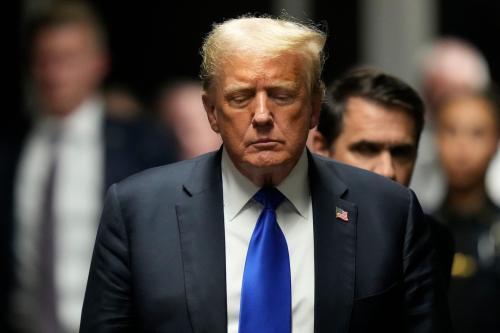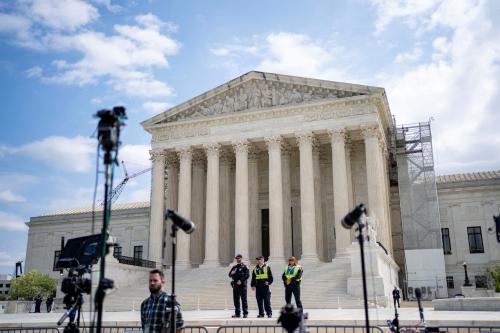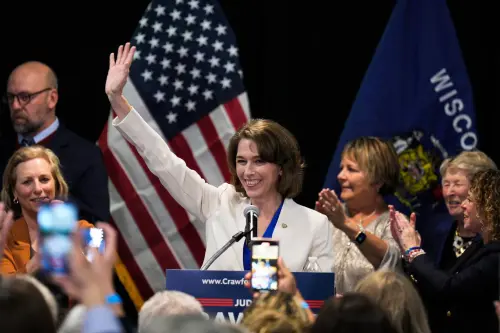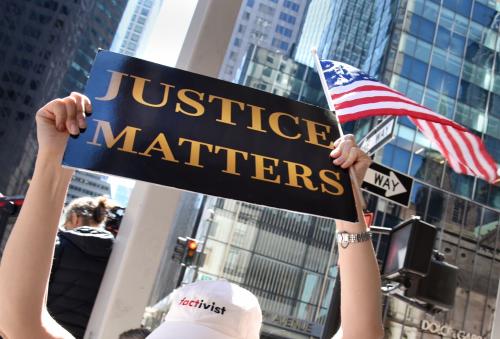On May 30, former president Donald Trump was found guilty by a Manhattan jury of 34 felony counts of falsification of business records in the first degree. The case revolved around payments made before the 2016 presidential election to adult film actress Stephanie Clifford, aka Stormy Daniels, in exchange for her silence about her allegation of an affair she had with Mr. Trump a few years prior. To talk about what the trial verdict suggests for governance, politics, and the rule of law, Norm Eisen, senior fellow in Governance Studies at Brookings and chair of the Anti-Corruption, Democracy and Security Project, joins The Current.
Transcript
DEWS: You are listening to The Current, part of the Brookings Podcast Network, found online at Brookings dot edu slash /podcasts. I’m Fred Dews.
Last week, on May 30th, former President Donald Trump, the presumptive Republican nominee for president this year, was found guilty by a Manhattan jury of 34 felony counts of falsification of business records in the first degree. The case revolved around payments made before the 2016 presidential election to adult film actress Stephanie Clifford, aka Stormy Daniels, in exchange for her silence about her allegation of an affair she had with Mr. Trump a few years prior.
To talk about what the trial verdict suggests for governance, politics, and the rule of law, I’m joined once again by Ambassador Norm Eisen, senior fellow in Governance Studies at Brookings and chair of the Anti-Corruption, Democracy, and Security Project at Brookings, ACDS for short. He also served as President Obama’s special assistant for ethics and government reform.
Norm, welcome back to The Current.
EISEN: Thanks for having me back, Fred, and so excited to talk about what I saw in court every day in Manhattan in the trial of Donald Trump. I think the one of the trials of the century.
DEWS: Well, Norm, I’m always excited to talk to you about any topic. This one is especially momentous. But first, I’ve introduced you numerous times on this podcast and on our previous show, The Brookings Cafeteria, by noting your former roles of ambassador, ethics czar, and now chair of the OECD’s project. But I’ve never introduced your very significant background in the law itself. Can you briefly tell our listeners a little bit about the experience you bring to analysis of legal cases, especially those involving the former president?
[1:56]
EISEN: Well, the the history of that background, of course, starts with my 20 years of practice mostly as a criminal defense lawyer as a partner in big litigation boutique specializing in white collar criminal defense. I worked on financial allegations of wrongdoing, like the Enron case, political investigations like the Clinton impeachment. And, after my sojourn as special counsel to President Obama, the ethics czar, as ambassador, came to Brookings. Took a leave to be the counsel for the first impeachment and trial of Donald Trump, where we investigated these same allegations that were at issue in the New York courtroom. And, of course, have continued, in my nonprofit roles as, co-founder of CREW, Citizens for Responsibility and Ethics in Washington, the States United Democracy Center, and now the State Democracy Defenders Fund to do pro-bono litigation, litigation in the public interest.
So, I brought all of those different lenses to bear. It’s almost it’s a total of almost 40 years in the courtroom through which I observed the judge, the jury, the the lawyers, the defendant, and everything that was going on in that Trump trial over almost two months of trial proceedings. I was there every day.
DEWS: So, Norm, keep us in that courtroom, that Manhattan courtroom. When the jury foreman read the 34 guilty verdicts against the former president. What did that feel like to you?
[3:55]
EISEN: History. It isn’t that often as a lawyer that you experience a legal first in American history. Even the impeachment and trial of Trump. We had the trial of Clinton. We had the trial of Andrew Johnson. So, even that trial, as rare as an impeachment trial of a president is, was not a first in American history. We’ve never had a president, former president, whose conduct was so egregious that a criminal jury stood and 34 times the foreman of that jury said “guilty.”
And what’s more, the crime was one that related to office because Trump was convicted of covering up a conspiracy to interfere with the 2016 election by paying hush money to keep information from voters. So, it was it was a momentous for for our nation and momentous for our democracy.
DEWS: And it was that latter piece that the payments were made to cover up information that could have been pertinent to voters’ choices in the 2016 election that made it a felony, the concealment of another crime?
[5:31]
EISEN: Correct. In New York, if you create a false document, in this case, Donald Trump was found to have been involved in 34 false documents at his business that should have said repay illegal hush money. And of course, people never write that down. So, what they write down is legal retainer. But this was not a legal retainer, Fred. As prosecutor Joshua Stein Glass said in his closing argument, this wasn’t a payment to a lawyer. This was a payment to a porn star. And a campaign contribution that was funneled through a lawyer.
So, it’s not right. You can’t write on the page “legal expense, legal retainer,” and those 34 pieces of paper covered up this money that was paid to keep critical information from voters coming after the Access Hollywood tape, where there was a tremendous national scandal because Trump was on tape saying that you can sexually assault women if you’re a star, you can even grab them by the P word. Grab them by their genitals. It was so shocking. Another sex scandal might have ended his campaign, or that was the worry.
So, they … this $130,000 payment was facilitated to benefit the campaign the jury found. And that was a part of an unlawful conspiracy to influence an election. It’s only a felony, those 34 false pieces of paper, are only a felony if they’re covering up the intent to commit another crime. And that’s what the election conspiracy was. It was the the second intended crime.
DEWS: So, a lot of the criticism of the verdict, which which flowed out of social media and out of networks almost immediately as it was being announced, setting aside the electoral aspect of the underlying crime itself, claim that it was bad bookkeeping, that those kind of financial crimes are victimless crimes. Some of those kinds of crimes can be misdemeanors. The crimes aren’t that serious. You know, there’s a lot of kind of rationalizations around the underlying financial side of the crimes. What do you make of those kinds of claims?
[8:12]
EISEN: People who we’re not in court did not understand. Some people, some understood, many did not understand the case and they’re just confused. Let me tell you, Fred, if I put 34 false expense reports, I said business trip to New York, when actually those funds were used to pay off a porn star, but that would be a very serious issue at Brookings and legally, right?
So, the notion that bookkeeping, you know, that’s a minor, I mean, that’s a big deal when you say it’s … when you tell the IRS that was part of the case of the IRS. So, this was, you know, this this was income to Cohen. What? This was a repayment of an expense. It was not income. That’s a material tax misstatement too.
But the the people did not understand or willfully through ignorance or intent or both, they said the most bizarre things. Some respectable people were even saying that that second crime, the campaign finance conspiracy, was not specified by prosecutors until the closing argument or not at all. It was so bizarre. And prosecutors spelled that crime out a year ago. My, my Brookings research work, by the way, was an important part of elucidating this. We were actually in some of our work were some of the first to point out the New York statute, an election conspiracy that prosecutors ended up relying upon. That was the core of their case for that second crime.
They in the end, they only argued one crime to the jury. Conspiracy under New York Statute 17 152 to interfere with an election through unlawful means. And the jury found Donald Trump intended to commit that crime and covered it up. They had to find that, to find the felonies.
DEWS: So, Norm, another issue that former President Trump and his supporters have raised to criticize the trial outcome is that presidents should have absolute immunity from criminal charges for official acts as president. And also it’s my understanding that this is one of the former president’s defenses in one of the other three cases pending against him right now, that presidents have absolute immunity for official acts.
[11:03]
EISEN: Now, it came up in the New York case, too, and I’ll tell you about that in a minute. This is the 2016 election interference case, and I wrote a book, Trying Trump: A guide to the trial. Trying Trump, a guide to his first election interference criminal trial. And that there was some controversy about that because was it an election interference case. Well, the prosecutors indubitably tried it as one. The jury convicted Trump for covering up the intent to interfere with an election. So, that question was resolved in the 2016 case.
But the 2020 case, also referred to as the attempted coup case that is in federal court in D.C. and also in Georgia state court against Trump for Georgia’s specific actions, that is the that is the very serious grave election interference from 2016 on steroids where they tried to, you know, a much larger version of this essentially voter deception to grasp power. That’s the structure of it.
Now, in 2020, they say, oh, this is at the Supreme Court. We’re waiting for a ruling. The Supreme Court has been … should have decided this five months ago when they were first presented with the question. Trump says, I’m presidentially immune, you can’t come after me for an attempted coup. Notoriously, Fred, he said, even if I sent Seal Team 6 out to commit assassinations, I could not be criminally prosecuted unless something happened that has never happened in almost two-and-a-half centuries of American history: impeachment and conviction at trial. And listen.
So, that bizarre proposition is up at the Supreme Court. I don’t know why they needed five months to decide that. Are they going to say yes, presidents could commit political assassinations? Of course not. The, you have to wonder if some of the former president’s allies on the court are not intentionally stalling this. This issue of presidential immunity should not stop, and I think will not stop, the federal prosecution when it’s resolved. Technically, it won’t stop it, but it’s taking so long that trial probably can’t be finished before the election. They tried it in New York, and it was rejected again and again.
It shows you you don’t have to take six months to throw out this ridiculous argument. They gave it the back of the hand in federal court. The case was removed in federal court at one point in New York. Sent back—the judge said there’s no such thing—sent back to the state court. They tried again in state court. It was dismissed out of hand, and it withered on the vine and died.
DEWS: Staying on that question of how long these trials are taking. Again, based on your extensive experience in the legal profession, it feels to a lot of people that it’s taking the wheels of justice a very long time to turn. Charges in the current case we’re talking about were filed over a year ago. The classified documents case that’s in Florida right now is seeing lots of delays. We’re three years past the events of January 6th. Why does it feel like the wheels of justice turn so slowly?
[14:37]
EISEN: Because they do as slow as as slow as a wealthy, powerful, experienced, defendant can cause them. That’s what’s happening here. Donald Trump is throwing sand in the gears of justice, constantly trying to slow them down. That’s what was so very impressive about Judge Merchan in this New York case and Alvin Bragg. They just never let up. They drove it through. They pushed it through. And it’s amazing that we got even one trial in.
I do think we’ll get a mini trial, so we’ll get like one-and-a-half. Because in the worst-case scenario, the Supreme Court at the end of June will announce a test that presidents are immune only if the following narrow circumstances are met. And they’ll remand that case back to Judge Chutkan and the United States District Court for the District of Columbia, the trial court to apply the test. And Judge Chutkan should have a mini trial to do it. She should take testimony, evidence, documents and determine if the test applies or not.
And of course, this conduct of Trump’s by any test is not immune. So, she should say, I find, you know, there was an attempted coup and it’s not immune. And then schedule a trial for as fast as she can if the Supreme Court goes that way. But, you know, you can’t, you you can’t always go fast when you have a very determined defendant like Trump. And he’s been effective in slowing things down.
DEWS: Also, Judge Merchan he set sentencing for Donald Trump for July 11th. You’ve written that the former president should be incarcerated. Why is that?
EISEN: Well, he should be sentenced to incarceration. There will be no incarceration before the presidential election in 2024. I believe that at that sentencing on July 11th, the judge should take account of the fact that these are very serious crimes of falsifying records to cover up an intended conspiracy to interfere with the election, that many people in New York who commit this crime, even first-time offenders, with a serious criminal intent—and what could be more serious than interfering with an election in a democracy?—many people do get jail time.
So, Trump has committed a more serious crime than any of them. That he’s been totally unrepentant. He even violated a gag order, was held in contempt ten times for making comments that could be dangerous to witnesses and to jurors. And, that it’s important to sound the alarm that you can’t get away with intending to interfere with an election, particularly when the former president has made comments that he won’t accept the 2024 election either if it doesn’t go his way.
So, both for deterring him and others from this kind of conduct and for all those other reasons, I think a jail sentence is appropriate, but the judge won’t require him to report to jail. That’ll be pending appeal.
DEWS: Well, finally, Norm, I want to end on this question. It’s something that everyone’s talking about. What impact, if any, do you think this will have on the rest of the presidential campaign and election in November? And I’ll note that supporters of former President Trump say that this trial and verdict itself is election interference.
[18:49]
EISEN: Holding any American accountable for conduct that all Americans would be prosecuted for it if they did it—if you or I falsified 34 documents, we would be prosecuted too; this happened in 2016, starting in 2016, it’s about time. You can’t blame, the timing on anybody but Trump. He’s furiously fought it. He went to the Supreme Court to stop the work of the Manhattan DA twice. So, the timing is is is Trump’s fault, as is the underlying conduct. So, I don’t think it’s, election interference. I just think that’s that’s inaccurate. There’s no evidence of that.
In terms of the what the impact will be, the polling impacts appear to be substantial. We’ve had a number of polls, and they’ve returned numbers like 50% of independents and a non-trivial number of Republicans think that Donald Trump should leave the race because of this verdict. So, it’s showing a profound impact on the groups that he’s going to need to persuade if his contest is to be successful.
So, we’ll see. It’s it’s a long ways out. But if you get the combination of this verdict and that mini trial, it might very well have an impact, but that only only time will tell.
DEWS: Well, Norm, there will be a lot more to see and say, and I look forward to talking with you more about it in the future. I also want to let listeners know that they can read your analysis of this trial and other legal cases on CNN, and they can visit our website to learn a lot more about you and your research at Brookings. So, once again, Norm, thanks so much for sharing your time and your expertise.
EISEN: Thanks, Fred. I appreciate you having me back. See you soon.
The Brookings Institution is committed to quality, independence, and impact.
We are supported by a diverse array of funders. In line with our values and policies, each Brookings publication represents the sole views of its author(s).







Commentary
PodcastWhat the Trump hush money trial verdict means for politics and the rule of law
Listen on
The Current Podcast
June 5, 2024